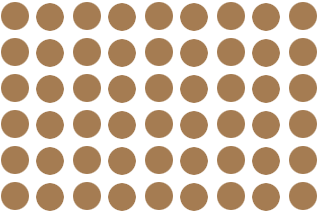What are the multiplication equations for this array?
What is....
3x4 or 4x3
4 x 5 = ___ x ___
5 X 4
5x5=
25
Use equal groups to solve the problem below:
Ms. McMaster has 6 tables in her classroom. Each table will get 1 box of 5 pencils.
How many total pencils does Ms. McMaster have?
Ms. McMaster has 30 total pencils.
What is repeated addition?
Repeated addition is when you add the same number over and over again.
Create a 4x6 array. How many objects are there total in your array?
24 objects
10 x 5 = ___ x ___
5 x 10
10x7=
Use equal groups to solve this problem:
Mrs. York gives 2 tables 5 pieces of candy. How much candy did Mrs. York give out?
10 pieces of candy.
What is equal groups?
Equal Groups is a strategy to solve multiplication where you have certain number of groups with an equal amount of objects in each group.

What are the equations for this array?
9x3 or 3x9
(3 x 2 ) x 5 is the same as (5 x 2) x 3
True or False
True
5x9=
45
Create a picture of equal groups for the multiplication sentence 3x4.
What is a factor?
A number that is being multiplied.
True or false:
Arrays are arrange in rows and columns
True
6 x 7 = ___ x 6
7
9x10=
90
Use Equal Groups:
Olive Chapel Elementary has 3 collection bins. Each bin has 5 boxes of canned goods. How many boxes of canned goods does Olive Chapel have?
15 boxes
What is a product?
The answer to a multiplication problem.
Create an array with a total of 30 objects.
Answers will vary:
3x10 10x3
5x6 6x5
1 x 9 = ___ x 1
9
4x6=
24
Use Equal Groups to solve this problem.
The third 3rd grade classes are going on a field trip. They will sit in 5 rows of 2. How many students will be on the bus?
5 x 2
What is the commutative property? And give an example.
The commutative property states that it does NOT matter the order of the factors or addends, you will still get the same answer when you multiply or divide.
Example: 5x1=5 ; 1x5=5